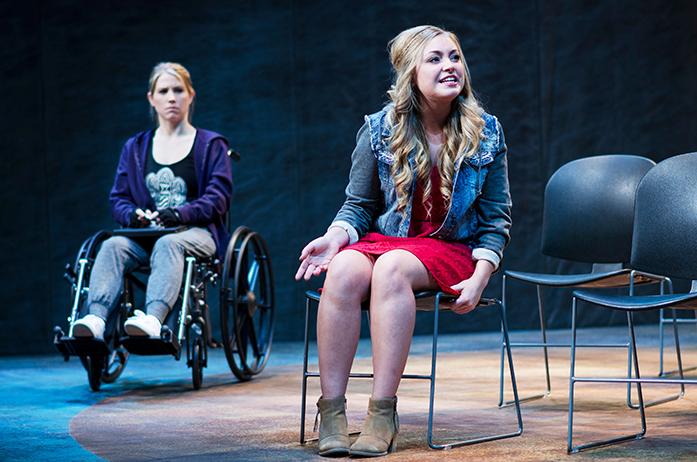An initiative to include more prominent female roles in the theater is gaining popularity at the UI and across the Big Ten.
By Addison Martin
While Broadway stages have been graced by only two plays written by female playwrights, the Big Ten Theater Consortium took notice of this and other issues with the lack of plays written, directed, or performed by females.
This resulted in the New Play Initiative.
The Big Ten schools formed the New Play Initiative in April 2013. The campaign to promote and stage more plays in which females play a major role, whether on or off the stage, has gained more and more traction in recent years.
Alan MacVey, the director of the University of Iowa Division of Performing Arts and a consortium member, said he believes the initiative seems to have been a large success since its start.
“Our goal was department-wide and also nationwide, and we certainly stimulated the conversation,” he said. “We’ve reminded writers that colleges are always looking for good plays and female roles.”
The UI’s first production commissioned by the New Play Initiative was Good Kids in February 2015, written by playwright Naomi Iizuka. She is the head of the M.F.A. playwriting program at University of California-San Diego.
Taylor Stuart, now a UI senior, starred in the role of Chloe, a girl whose night out goes wrong. Good Kids delves into the issues of sexual assault and rape culture in a media-driven age.
“I was initially going to focus on directing that semester, and then I read about this role and that the Big Ten Theater Consortium was pushing for more roles for women,” Stuart said. “I thought, ‘I have to audition.’ ”
The UI’s most recent production, in February, through the Big Ten Consortium, Baltimore, deals with the equally heavy issue of racial issues on campus.
UI student Madeline Ascherl, who was cast as a discriminatory character, Fiona, said she had a tough time not judging her character, and has had a tough time dealing with issues of body type in female roles during her career.
“I’m 5-9, and because I wasn’t the typical petite ingénue, I would be cast in the funny or older roles,” she said. “We stereotype that the ingénue has to be very feminine, the typical blonde hair with blue eyes. I think the Big Ten Commission itself is pushing for real, strong independent women who don’t conform to a certain type or look, and I think that’s really important.”
An idea sparked by a conversation between MacVey and his wife started the now three-year process of initiating more strong female voices into theater departments across the country.
“… she said there’s just too few good roles for women, even compared to six or seven years ago, and I thought she was absolutely right,” he said. “We needed to do something about it. We tried to bring it to the National Association of Schools of Theater, which I was president of, but it’s hard to do something about it on your own, so I took it to the Big Ten. We sat down that fall and created the New Play Initiative.”
MacVey said he hopes this will continue for more years, and he keeps reminding the public there are still three more plays of this type to be performed in Iowa City.
The commission commits the consortium to five plays, after which the members will decide if they want to continue with the program, MacVey said.
“I think there will be a mixed response, and this is clearly a very successful commission, but everybody does have to put in $1,000 every year, and that’s easier for some schools than for others,” he said. “It will be a conversation, but still, the fact is that we still have three more coming.”



